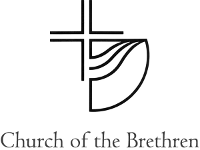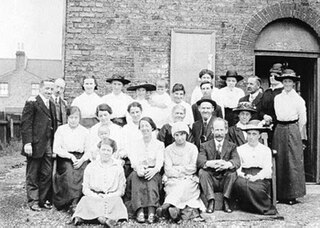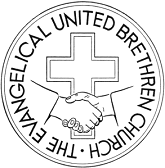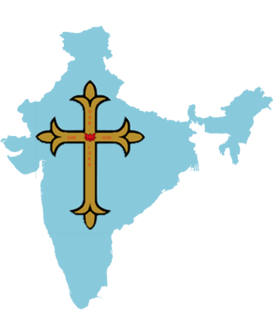
The Church of the Brethren is an Anabaptist Christian denomination in the Schwarzenau Brethren tradition that was organized in 1708 by Alexander Mack in Schwarzenau, Germany during the Radical Pietist revival. The denomination holds the New Testament as its only creed. Historically, the church has taken a strong stance for nonresistance or pacifism—it is one of the three historic peace churches, alongside the Mennonites and Quakers. Distinctive practices include believer's baptism by forward trine immersion; a threefold love feast consisting of feet washing, a fellowship meal, and communion; anointing for healing; and the holy kiss. Its headquarters are in Elgin, Illinois, United States.

An agape feast or lovefeast is a communal meal shared among Christians. The name comes from agape, a Greek term for 'love' in its broadest sense.

The Plymouth Brethren or Assemblies of Brethren are a low church and non-conformist Christian movement whose history can be traced back to Dublin, Ireland, in the mid to late 1820s, where they originated from Anglicanism. The group emphasizes sola scriptura, the belief that the Bible is the supreme authority for church doctrine and practice, over and above any other source of authority. Plymouth Brethren generally see themselves as a network of like-minded free churches, not as a Christian denomination.

The Evangelical United Brethren Church (EUB) was a North American Protestant church from 1946 to 1968. It was formed by the merger of the Evangelical Church and the Church of the United Brethren in Christ. The United Brethren and the Evangelical Association had considered merging off and on since the early 19th century because of their common emphasis on holiness and evangelism and their common German heritage. In 1968, the United States section of the EUB merged with the Methodist Church to form the United Methodist Church, while the Canadian section joined the United Church of Canada.

The Brethren in Christ Church (BIC) is a River Brethren Christian denomination with roots in the Mennonite church, Radical Pietism, and Wesleyan holiness. They have also been known as River Brethren and River Mennonites. The Canadian denomination is called Be In Christ.
The Church of the United Brethren in Christ is an evangelical Christian denomination with churches in 17 countries. It is Protestant, with an episcopal structure and Arminian theology, with roots in the Mennonite and German Reformed communities of 18th-century Pennsylvania, as well as close ties to Methodism. It was organized in 1800 by Martin Boehm and Philip William Otterbein and is the first American denomination that was not transplanted from Europe. It emerged from United Brethren churches that were at first unorganized, and not all of which joined this church when it was formally organized in 1800, following a 1789 conference at the Otterbein Church.

Peace churches are Christian churches, groups or communities advocating Christian pacifism or Biblical nonresistance. The term historic peace churches refers specifically only to three church groups among pacifist churches:

A united church, also called a uniting church, is a church formed from the merger or other form of church union of two or more different Protestant Christian denominations.

The Church of North India (CNI) is the dominant united Protestant church in northern India. It was established on 29 November 1970 by bringing together the Protestant churches working in northern India. It is a province of the worldwide Anglican Communion and a member of the World Methodist Council and the World Communion of Reformed Churches. The merger, which had been in discussions since 1929, came eventually between the Church of India, Pakistan, Burma and Ceylon (Anglican), the United Church of Northern India,, the Methodist Church, Disciples of Christ denominations.

The Indian Brethren are a Christian Evangelical premillennial religious movement. Although they have some distinct characteristics, they have a lot in common, in both doctrine and practice, with the international Open Brethren movement, with whom nearly all of them are historically affiliated.
The Indian Pentecostal Church of God (IPC) is the largest Pentecostal Christian Denomination in India. It has over ten thousand congregations around the world. Its organisational headquarters is at Hebronpuram, Kumbanad, Kerala, India. IPC has some similarities with Kerala Brethren especially in orthodoxy and eschatology where large group of early members were from this denomination. IPC shares its beliefs with Assemblies of God, Church of God and Sharon Fellowship Church. However, it distances itself from TPM, which according to IPC promotes legalism. The church has a tendency to stray from ecumenism, as several of its leaders often denounce high church liturgy as a method of worship, instead embracing low church contemporary worship. It believes in Baptism of the Holy Spirit as separate event and does not believe in cessationism.

The Kerala Brethren are a significant subset of the Open Brethren movement. In the South Indian State of Kerala, four Syrian Christian (Nasrani) men who came from traditional churches were baptised in 1898, and many of the Kerala Brethren consider this event to have been the start of their movement. Some 600 of the 2,200 Brethren assemblies in India are located in Kerala.
Sikalongo is a rural community in the Southern Province of Zambia. It is located 30 km east-south-east of Choma in the Singani Chieftaincy, not far from the Zambezi Escarpment north-west of Lake Kariba. It existed as a traditional community until the early twentieth century when American missionaries from the Brethren in Christ Church established a mission station there. During the first half of the twentieth century, missionaries established a church, a clinic, and a primary school. In 1968, the Brethren in Christ church established a Bible Institute which continues to the present. With help from the local community, the mission station established a secondary school during the 1970s.
Macha Mission is a mission station in the Choma District of the Southern Province of Zambia. While it started out as a place to convert the local population to Christianity, it has grown into a community centre with a church, five schools, a hospital and a malaria research centre.
Protestants in India are a minority and a sub-section of Christians in India and also to a certain extent the Christians in Pakistan before the Partition of India, that adhere to some or all of the doctrines of Protestantism. Protestants in India are a small minority in a predominantly Hindu majority country, but form majorities in the north-eastern states of Meghalaya, Mizoram& Nagaland and significant minorities in Konkan division, Bengal, Kerala& Tamil Nadu, with various communities in east coast and northern states. Protestants today trace their heritage back to the Protestant Revolution of the 16th century and Ancient Christianity in the Indian Subcontinent.
An ordinance is a term used by certain Christian denominations for a religious ritual that was instituted by Jesus for Christians to observe.
The Open Brethren, sometimes called Christian Brethren, are a group of Evangelical Christian churches that arose in the late 1820s as part of the Assembly Movement within the Plymouth Brethren tradition. They originated in Ireland before spreading throughout the British Isles, and today they have an estimated 26,000 assemblies worldwide.
Brethren is a name adopted by a wide range of mainly Christian religious groups throughout history. The largest movement is Anabaptist.







